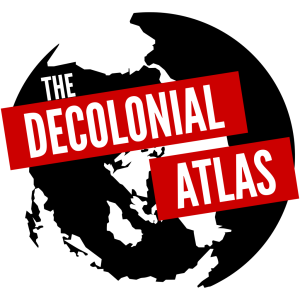
An endonym is the name for a geographic location in the language of the people who live there. It is contrasted with an exonym, which is a place name in the language of people who are not native to that place. For example, “America” is an exonym given to continent by a German cartographer, Martin Waldseemüller, who had never been there, and who named it for another European cartographer, Amerigo Vespucci. There are, however, many endonyms for “America.” The continent is known as Kéyah dah siʼánígíí in Diné bizaad (Navajo), Ixachitlān in Nāhuatlahtōlli (Nahuatl), Posno choba ihaanosi in Albaamo innaaɬiilka (Alabama), and Awya Yala in Runa Simi (Quechua), among others. For the purposes of this map, the name that appears is from the language that is most widely used in that area. In some cases, like “Australia,” there are no widely used indigenous endonyms. Others, like “Antarctica,” have no indigenous human population at all, though English is often used as a lingua franca among the scientists who work there.
Landmasses (continents and islands) in order of area:
Location name in English: Location endonym (Language endonym [Language exonym]) “Translation”
Afro-Eurasia: 歐亞非大陸 (中文 [Chinese])
The Americas: Awya Yala (Runa Simi [Quechua])
Antarctica: Antarctica (English)
Australia: Australia (English)
Greenland: Kalaallit Nunaat (Kalaallisut [Greenlandic]) “Land of the Kalaallit”
New Guinea: Niugini (Tok Pisin)
Borneo: Kalimantan (Bahasa Indonesia [Indonesian]) “Burning weather island”
Madagascar: Madagasikara (Malagasy)
Baffin Island: ᕿᑭᖅᑖᓗᒃ (ᐃᓄᒃᑎᑐᑦ [Inuktitut])
Sumatra: Sumatera (Bahasa Indonesia [Indonesian])
Honshu: 本州 (日本語 [Japanese]) “Main island”
Victoria Island: Kitlineq (Inuinnaqtun)
Great Britain: Great Britain (English)
Ellesmere Island: Umingmak Nuna (ᐃᓄᒃᑎᑐᑦ [Inuktitut]) “Land of muskox”
Sulawesi: Sulawesi (Bahasa Indonesia [Indonesian])
The South Island of New Zealand: Te Waipounamu (Māori [Maori]) “The waters of pounamu”
Java: Jawa (Basa Jawa [Javanese])
The North Island of New Zealand: Te Ika-a-Māui (Māori [Maori]) “The fish of Māui”
Luzon: Luzon (Tagalog)
Newfoundland: K’taqmkuk (Míkmawísimk [Mi’kmaq]) “Land across the water”
Cuba: Cuba (Taíno)
Iceland: Ísland (Íslenska [Icelandic])
Mindanao: Mindanao (Sinugboanon [Cebuano])
Ireland: Éire (Gaeilge [Irish])
Hokkaido: アイヌ モシㇼ (アィヌイタㇰ [Ainu]) “Land of humans”
Hispaniola: Haiti (Taíno)
Sakhalin: カムィカㇻプㇳヤモシㇼ (アィヌイタㇰ [Ainu]) “”Land at the shore of the God-made (river) mouth/confluence.”
Sri Lanka: ශ්රී ලංකාව (සිංහල [Sinhala])
Tasmania: lutruwita (palawa kani) *palawa kani does not capitalize the first letter of a toponym
Severny Island: о́стров Се́верный (Русский [Russian]) “Northern island”
Spitsbergen: Spitsbergen (Norsk [Norwegian]) “Pointed mountains”
Kyushu: 九州 (日本語 [Japanese]) “Nine provinces”
Taiwan: 臺灣 (Chinese]) Hainan: 海南 (中文 [Chinese])
Vancouver Island: Thi Skwithe (Hul’qumi’num [Halkomelem]) “Big island”
Timor: Timor (Bahasa Indonesia [Indonesian])
Sicily: Sicilia (Sicilianu [Sicilian])
Kotelny Island: Олгуйдаах арыы (Саха тыла [Sakha])
Sardinia: Sardigna (Sardu [Sardinian])
New Caledonia: Kanaky (Paicî)
Viti Levu: Viti Levu (Na Vosa Vakaviti [Fijian])
Hawai’i (Big Island): Hawai’i (ʻŌlelo Hawaiʻi [Hawaiian])
Cape Breton Island: Únamakika (Míkmawísimk [Mi’kmaq])
*An earlier version misspelled the Ainu name for Sakhalin. Thanks to Charles Lippert for the correction.
Map: Jordan Engel. As always, the Decolonial Atlas’ original media can be reused under the Decolonial Media License 0.1.

I’m sorry, but what exactly is “Afro-Eurasia” and why is the only name ascribed to a continent full of black people written in a Chinese language?! The Chinese are not indigenous to the continent of Africa. The Chinese are simply the newest colonizers of Africa. To completely ignore the native inhabitants of Africa is absolutely moronic. Ancient Egyptians called it Kemet, “Kem” meaning black and “Kemet” meaning “Black Land” referring to the richness of the soil and the fertility of the land. Or better yet, you should be using ancient Egyptian hieroglyphs and referring to it as “Hwt-ka-Ptah”.
LikeLike
Surely during the course of this project you must have realized how arbitrary (and therefore futile) this all is. The world has been in a constant state of migration and colonization since we first ventured out of the cradle. So who gets to decide who is endemic and who is a colonist? What date or dates are we using?
Just off the top of my head: Great Britain wasn’t named by the English (the Angles didn’t invade from Germannia until the 5th century). It’s based on “Brittania”, which was a Latin name given to the island by the Romans (certainly a colonial power if ever there was one) to say nothing of the Picts, Scotti, Gauls, Silurians, or anyone else who might have called the island home.
‘Sicilia’ is another of obviously Latin origin, derived from Sicania, the name given to it by the Greek colonists 500 years prior. Nobody knows what the Sikeloi people called it, but considering they shared the island with at least 2 other tribes (not to mention Phoenican colonists from Africa) it’s unlikely the island ever had anything resembling an endemic name.
You mentioned ‘Australia’ having no endemic alternative, but surely a Latin name is as far from Aborigine as you can get. Earlier explorers called it ‘New Holland’, but either name is the definition of colonial, so at that point why bother?
I’d argue there’s almost no such thing as a ‘decolonial’ name. Humans are natural explorers and namers-of-things. This is just an arbitrary selection from a list of historical alternatives. I’d argue that attributing some sort of ‘correctness’ to any historical name is at least as insulting to all the people who have ever lived there as agreeing upon the name chosen by its current inhabitants.
LikeLiked by 1 person
point totally taken on australia, and even britain could be albion etc [Latin], but no one said anything about ” ‘correctness’ “.
imo a decolonial name isn’t just etymologically/historically accurate: a decolonial name is one chosen by people who want to decolonise themselves. nothing to do with correctness, nothing to do with insults. it’s not turning back the clock, rather it’s a future-oriented an action.
LikeLiked by 1 person